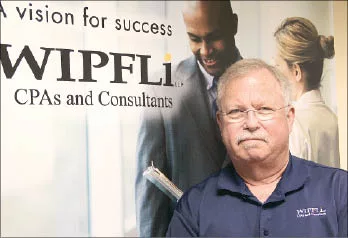
Home » CPA firm focuses on health care clients, keeps growing
CPA firm focuses on health care clients, keeps growing
Spokane office of Wipfli offers consulting services aimed at rural providers

August 2, 2012
Mike Bell has been steeped in the health care industry for years, but not because he's been taking temperatures or writing prescriptions.
Rather, Bell, certified public accountant and partner at the Spokane office of Edina, Minn.-based firm Wipfli LLP, has been at the forefront of providing accounting, tax, and consulting support to hospitals, clinics, and other health care companies. The office has also dedicated resources to helping rural health care systems that often find themselves on the chopping block for state and federal funding.
"Rural health care is very vulnerable in terms of the health care system," Bell says. Generally, rural health care providers serve a population where access to care is limited and the elderly population is higher than in neighboring urban areas, Bell says.
The Wipfli branch here, located at 12 E. Rowan in North Spokane, serves roughly 80 hospitals, 50 clinics, and a number of other organizations, providing auditing, consulting, and accounting services to the health care industry in 14 states. Inland Northwest hospitals being served by Wipfli include those in Bonners Ferry and Moscow, Idaho, and Newport, Wash.—critical-access areas where residents would have to commute to larger urban areas like Spokane for medical help if a local rural hospital were to close.
Wipfli also consults with hospitals and health care companies, including Providence Health Care, Peace Health, and Catholic Health Initiatives. These companies and others use Wipfli services to better assist and work with small, rural hospitals.
Overall, Wipfli has 138 partners and affiliated offices, with over 1,000 associates employed worldwide. It has 22 offices in the U.S. as well as two offices located in India.
One way Wipfli acts as a resource for its clients is by working with hospitals to help them use their resources effectively. Much of what Bell and his team do centers around working with them on Medicare and Medicaid reimbursements. Bell says it isn't uncommon to find additional reimbursements for hospitals in the range of $100,000 to $300,000 a year. He says that for some smaller hospitals, that amount can be the difference between staying open or shutting the doors.
The Spokane office has experienced a 10 percent growth rate in revenues annually, which mirrors the historical growth rate by Wipfli as a whole, but who has seen that percentage increase drop to around 5 percent during the past fiscal year.
"As the economy has suffered and businesses experience a downturn, we have grown," he says.
Bell says that as the office continues to grow, Wipfli might need to look for a larger office, but it isn't currently looking for new space.
The Spokane office has 20 employees. Bell says it recently hired two new graduates from Inland Northwest universities, citing the caliber of the accounting programs.
Prior to the summer of 2010, Bell owned his own CPA and consulting practice, called Michael R. Bell & Co. PLLC, for roughly 20 years, employing 20 people full time. Michael R. Bell & Co. originally had an office location in downtown Spokane before moving to the space on Rowan in an effort to be more accessible to its rural clients, Bell says.
It then merged with Wipfli on Aug. 1, 2010, culminating a six-month process. Of the 20 employees who worked for Bell & Co. before the merger, 18 are still working for Wipfi.
Approached earlier by a number of other accounting firms interested in merging, Bell held off until an opportunity arose with Wipfli, which he says, was aware that much of Bell's client base largely involved rural hospitals.
"I knew it was going to work well, but it's worked even better than that," says Bell.
Joining with Wipfli has given Bell and his team the opportunity to provide a higher level of service to their clients, he says. He says although his former company had a high level of expertise, they were limited in what they could do.
"I've always told my clients that if you've got a question, I've got an answer or I can find out pretty quickly," he says. Now, Bell has cut out much of the research process by being connected to other experts and resources through Wipfli, increasing company efficiency in helping not only rural health care systems, but also those who seek out Bell and Wipfli for consulting purposes.
"Now I don't have to worry if it's the right answer; it's definitive."
With the controversial Patient Protection and Affordable Care Act, Bell says their clients will experience both positive and negative effects.
The health care reform "is going to have a very positive effect on the small rural hospitals we work with," Bell says. "But they will be challenged by changes in the state Medicaid programs."
Bell says the state Medicaid program currently accounts for a substantial portion of the revenues at most critical-access hospitals, like those in North Idaho. He says the state legislature is looking at a bill that would cut Medicaid spending, potentially costing rural hospitals upwards of $15 million a year in Medicaid payments. Another challenge faced by rural hospitals is the rapid increase in uncompensated care. Bell says the economic decline has left many people without health care coverage, so hospitals aren't reimbursed for a lot of the care they provide.
Spending years working as a consultant and CPA for the health care industry, Bell is no stranger to changes and reform.
"It's safe to say in the past five years, I've seen more changes in the health care industry than in the last 20 years combined," he says.
iVantage, a company that provides research on health care, found in a study that in general, health care dollars, and specifically Medicare dollars, are significantly more cost effective in rural areas than in urban settings. Data shows that on average, the cost per rural beneficiary is 3.7 percent lower than the average cost per urban beneficiary, meaning a difference in $9.4 billion annually.
Bell says one of the biggest concerns he has is if rural health care facilities close, then the area residents who use those facilities would have to commute to larger urban areas for care. Bell says this equates to more money being spent rather than saved overall.
"It's foolish to think they'd be saving money when it doesn't appear to be the case," says Bell.
Latest News
Related Articles




